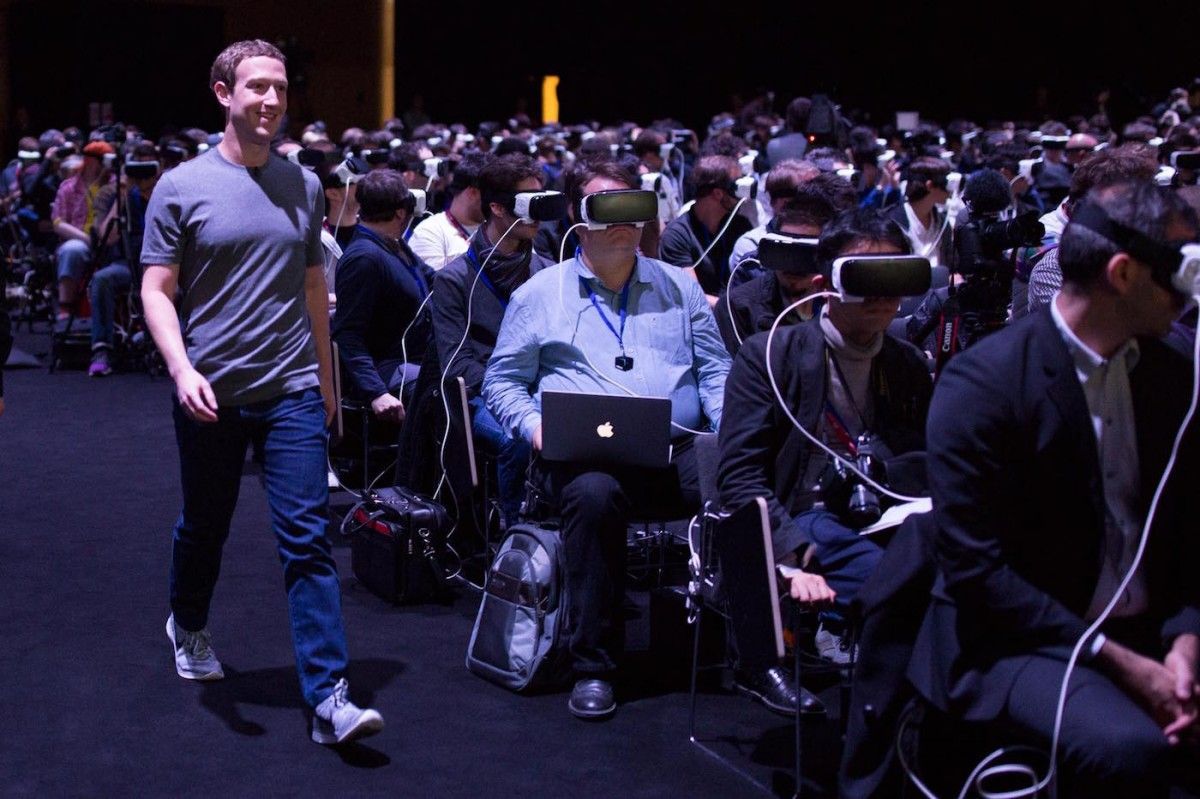The hypnotic documentary Hypernormalization, by British director Adam Curtis, takes its name from a concept developed by Soviet writer Alexei Yurchak. In his book Everything was Forever, Until it was No More, Yurchak describes the tense social and cultural atmosphere during the years prior to the collapse of the Soviet Union. As Curtis describes, after decades of attempting to plan and manage a new kind of socialist society, the technocrats at the top of the post-Stalinist USSR realized that their goal of controlling and predicting everything was unreachable. Unwilling to admit their failure, they “began to pretend that everything was still going according to plan”. The official narrative created a parallel version of the Soviet society, a fake reality (like in the home videos of Good Bye Lenin) that everyone would eventually unveil. But even though they saw that the economy was trembling and the regime’s discourse was fictitious, the population had to play along and pretend it was real… “because no one could imagine any alternative. (…) You were so much a part of the system that it was impossible to see beyond it”.
Nowadays, our society is driven by very different forces. We don’t need technocrats to predict our actions; the last advancements in information technology, in addition to our constant disposition to share everything that happens to us, are enough for an invisible —and, apparently, non-human— power to define and limit our behaviour. In his book Social Media Abyss, the Dutch theorist Geert Lovink —founding director of the Institute of Network Cultures in Amsterdam— speaks about the dark side of these new technologies and the consequences of our blind trust in the digital industry.
The closest comparison that we have today to the New Soviet Man is perhaps the cult to the cyberlibertarian entrepreneur of Silicon Valley. We are now used to thirty-somethings in sweaters telling us, from the ping-pong tables in their offices, that the only road to success —both personal and collective— lies in technology. To oppose them is no easy task: who is going to question a discourse that has innovation and “the common good” at its core? But the internet today hardly resembles the technology that, in its origins, seemed to promise a source of decentralization, democratization and citizen empowerment. Nowadays, the giants of Silicon Valley —lead by Facebook and Google— have mutated towards a monopolistic economic model and flirt with intelligence agencies for the exchange of their precious data.
Our relationship with the internet seems to be on its way to becoming something very similar to the later years of the Soviet Union. The Spanish sociologist Cesar Rendueles formulates this concern when questioning the capacities of technology to guarantee a plural and open space: “the network ideology has generated a diminished social reality”, he claims on his essay Sociophobia: Political Change in the Digital Utopia. Lovink shares the “healthy scepticism” of Rendueles when elaborating what we could call an “Internet critical theory”. In Social Media Abyss, he inaugurates the post-Snowden era — “the secular version of God is Dead”— as the beginning of a general disillusionment with the development of the internet: now we can say that the internet “has become almost everything no one wanted it to be”. But even though we know that everything we do online may be used against us, we still click, share and rate whatever appears on our screen. Can we look at the future with optimism? Or are we too alienated, too precarized, too desocialized (despite being constantly “connected”) to design alternatives? In the words of Lovink, “what is citizen empowerment in the age of driver-less cars”?
The year did not start all that well. The big political changes of 2017 have been, as Amador Fernández Savater has described, “a kind of walking paradox: anti-establishment establishment, anti-elitist elite, antiliberal neoliberalism, etc.”. But fortunately, politics not only consists of electoral processes. Lovink has spent decades studying the “organized networks” that operate outside the like economy: “The trick is to achieve a form of collective invisibility without having to reconstitute authority”. We spoke with him not only about the degradation of the democratic possibilities of the internet (and the possibilities for coming up with an equitative revenue model for the internet) but also about how to design the alternative.
We may opt for hypernormalizing everything: “nothing to see here, let’s keep browsing”. Any other option involves theorization as we advance on our objectives. The answer lays on creating “dissident knowledges”.
“Radical disillusionment”
Your latest book starts with the idea that the internet, initially portrayed as a democratizing and decentralising force, “has become precisely everything no one wanted it to be”. The once uncontested Californian ideology is now being challenged for the first time, after the Snowden revelations showed us that we have lost any controlled, pragmatic rule over internet governance. What is our next move?

Geert Lovink
I don’t want to make it too schematic, in terms of chronology. But because the internet is still growing so fast, it is really important to ask ourselves: “where are we“? This was really the “beginners” question, but for a while, the discussion turned to what it could become. The Snowden revelations, together with the 2008 crisis, should make us go back to the original question: where is the internet now?
I like to see the internet as a facilitating ideology. This is a notion that comes from Arthur Kroker, a Canadian philosopher working in the tradition of Marshall McLuhan. It is obviously not repressive, let alone aggressive, as it does not cause any physical violence on you. But what it does is that it facilitates.
Since the 2000s and the so called Web 2.0, the internet has been primarily focused on its participatory aspect. Everywhere you go you are asked not simply to create a profile, but to contribute, to say something, to click here, to like… The internet these days is a huge machine that seduces the average user without people necessarily understanding that what they do creates an awful load of data.
The fact that we are not aware of what the data we produce is used for seems to be the problematic aspect. Precisely one of the defining phrases of the book is that “tomorrow’s challenge will not be the internet’s omnipresence but it’s very invisibility. That’s why Big Brother is the wrong framing”. In the internet, power operates in the collective unconscious, more subtly than a repressive force. In fact, “the Silicon Valley tech elite refuses to govern”, you say; “its aim is to achieve the right for corporations to be left alone to pursue their own interests” . So how do you better describe this?
Yes, you can see that even after Trump’s win. They take the classic position of not governing. This is in a way a new form of power, because it’s not quite Foucauldian. Even though we would love to see that it is all about surveillance —and the NSA of course invites us to go back to this idea—, the internet is in a way post-Foucauldian. If you read Foucault’s last works, he invites us to that next stage, to see it as the Technology of the Self. That would be the starting point to understand what kind of power structure there is at stake, because it is facilitated from the subject position of the user. And this is really important to understand. All the Silicon Valley propositions or network architectures have that as the starting point.
Nowadays, surveillance is really for the masses and privacy is for the upper class
In a way, this invites us —the activists, the computer programmers, the geeks— to provoke the internet to show its other face. But for the ordinary user this other face is not there. And when I say ordinary I mean very ordinary. If you look at the general strategy, especially of Facebook, the target is this last billion, which is comprised of people really far under poverty levels. When we’re talking about the average internet user, we are not talking about affluent, middle-class, people anymore. This is really something to keep in mind, because we need to shed this old idea that the internet is an elitist technology, that the computers were once in the hands of the few, that the smartphone is a status symbol, etc. We are really talking about an average user that is basically under the new regime of the one percent, really struggling to keep afloat, to stay alive.
So when I say invisibility, I mean that this growing group of people (and we’re talking about billions across continents) are forced to integrate the internet in their everyday struggles. This is what makes it very, very serious. We’re not talking about luxury problems anymore. This is a problem of people that have to fight for their economic survival, but also have to be bothered with their privacy.
That is what I call facilitating. When we are talking about facilitating, it also means that we are dealing with technologies that are vital for survival. This is the context in which we are operating now when we hear that the internet has been democratized. It doesn’t mean that there is no digital divide anymore, but the digital divide works out in a different way: it’s no longer about who has access and who doesn’t. It’s probably more about services, convenience, speed… and surveillance. Nowadays, surveillance is really for the masses and privacy is for the upper class. And then the offline is for the ones who can really afford it. The ones who are offline are absolutely on the top. And it didn’t use to be on top. It used to be reversed. These are really big concerns for civil society activists and pro-privacy advocates.
The social in social media
These brings us to the issue of “the social in social media”. You call it an ‘empty container’, affected by the “shift from the HTML-based linking practices of the open web to liking and recommendations that happen inside closed systems”, and call for a redefinition of the ‘social’ away from Facebook and Twitter. Could you develop this idea?
It is really difficult these days to even imagine how we can contact people outside of social media. In theory it’s still possible. But even if you look at the centralized email services, like Hotmail, Yahoo and Gmail, they are now completely integrated in the social media model and they are, in fact, its forerunners. However, the problem really starts with the monopolistic part of the platform: the invisible aggregator that is happening in the background that most users have no idea about. Even experts find it very hard to really understand how these algorithms operate.
In this field, where there are a lot of academics but no critics, there is an enormous overproduction of real life experience and practice
Why has there not been any attempt from political science or sociology, at least that I know, to theorize the Social in Social Media? Obviously this is because the ‘social’ in scientific terms has really been reduced to the question of classes. But the idea that you can construct the social… sociology has a hard time to understand this. Historically it would understand that the social consists of the tribe, the political party, the Church, the neighborhood, etc. We know all the classic categories. Maybe when they are a bit newer they would talk about subcultures or gender issues. These are the “new” configurations of the Social.
But the idea that communication technology can construct and really configure the social as such, despite all the good efforts of science and technology scholars, has caught them by surprise. I think this is especially due to the speed and the scale; the speed at which the industry established itself and the scale of something like Facebook, which now connects almost two billion people. If you would have told that to someone 20 or 30 years ago it would have been very difficult to imagine, how a single company could do that.
Something that is clear in your work is the need to take technology seriously. Rather than falling in the trap of “offline romanticism” —or its alternative “solutionism”—, you are interested in “organized networks” that are configured in this day and age, because technology is going to stay whether we want it or we don’t. Against this, you appeal to the importance of theory. “What is lacking is a collective imagination (…). We need to develop dissident knowledges”, you say. What is the role of theory in all this? Isn’t there a sense of urgency to act right now?
The urgency is felt by the young people. I can only point to numerous experiments going on at the moment which could tell us something about the models that could work. What is important now is to write down the stories of those who are trying to create alternative models and to really try to understand what went wrong, in order to somehow make those experiences available for everyone who enters this discussion.
In this field, where there are a lot of academics but no critics, there is an enormous overproduction of real life experience and practice. However, there is almost no reflection happening. This is in part because the people who build the technologies are quite entrepreneurial or geeky and they don’t necessarily see the bigger picture. So that is our task, that is what projects like the MoneyLab network aims for.
The entire industry is not changing fast enough to accommodate the rising group of precarious workers

Mark Zuckerberg en el World Mobile Congress 2016.
Internet revenue models
One of the big problems of this lack of theorization, as you point out in the book, is that the internet was not built with a revenue model in mind. We pay for access, hardware and software but not for content, so there are fewer and fewer opportunities to make a living from producing it. You call it “anticipatory capitalism”: “if you build it, business will come”, they tell us. What is even more striking is that your own experience from decades ago seems to point out to no advancements. This lack of direction has given place to a number of contradictions; for instance, freelance work, “simultaneously denounced as neoliberal exploitation and praised as the freedom of the individual creative worker”.
In a way, the internet today has a very traditional financial model. It is essentially based on targeted advertisement, which already existed in the past, but it was not focused on the individual. This caught me by surprise as well because I thought, especially in the early 2000s, that advertisement in an internet context was more or less dead, that beyond the web banner there wasn’t really much else. Of course, there was e-commerce but that’s something different, because then you are purchasing something, there is a real money transaction.
What really remains unsolved —and not much has changed since the 1980s— is the problem of how to pay the people that produce the content. The entire industry is not changing fast enough to accommodate the rising group of precarious workers. We can see some solutions on the horizon, going in different directions, but again we have to fight against the free services of Facebook, Google and all these other companies based on advertisement and data resell, who will always try to sabotage or frustrate the implementation, because, obviously, it is not in their interest that these new models start to work.
The only thing we can say is that, luckily, since 2008, there is something happening in different directions. And the more we try, the more certain we can be that, at some point, something will work out. To just wait until the industry solves it is not going to work because, again, we know the main players will frustrate these developments. Because that will be the end of their revenue model.
These strategies will only work if they becomes ubiquitous, if they are somehow integrated in the plan of becoming invisible
What happens with some of these advancements, like crowdfunding, is that while they are portrayed as alternative models, they still don’t solve the question of how to get paid for produced content.
The thing with crowdfunding, for instance, is that while it can work (and I know it has worked for many friends of mine) it usually only works once. It is very difficult to repeat. I find the Patreon model more interesting, in which people subscribe to you as an artist, or a writer, or a magazine, and have the possibility to fund you over time. That goes back to my previous idea that the internet should have developed itself through the subscription model but it didn’t, and I think that’s a lost opportunity. Even if it catches momentum again in 10 or 20 years, it already means that numerous generations, including my own, have been written off. At the moment, we are still supposed to contribute to the internet, to bring their content online, discuss, organize and so on, without anything coming back to us.
Some of these models, however, can easily get mistaken with an act of charity.
At the moment, when we’re still on defense, every attempt that tries to put the revenue model situation on the table and bring the money back to the content producers, is a good thing. Kim Dotcom, for instance, is planning on launching a kind of revenue model system connected to bitcoin. He is of course speaking to really broad, mainstream culture. On the more obscure side we have this cyber currency experiment called Steemit, which also works with the idea that if you read something and you like it, you pay for it.
First, we have to understand that these strategies will only work if they becomes ubiquitous, if they are somehow integrated in the plan of becoming invisible. Because if they aren’t, if time and again you have to make the payment a conscious act, it is not going to work. These payments, or this redistribution of wealth and attention, in the end, need to be part of an automated system. And we have to fully utilize the qualities and the potential that the computer offers us in order for it not to remain a one-off gift. Because it’s not a gift. We are not talking about charity.
Designing alternatives
So you have a precarious youth, with high levels of disenchantment and short attention spans, living within a system that seems to absorb whatever is thrown against them and come up even stronger after crises.
It feels like social media and the entrepreneurial industry is designed for non-revolt. Because “we are Facebook”: you are the user all the time. Some would say that for us to move forward all we have to do is to stop using these platforms. But is that really the move?
I find difficult to make any moral claims because of how it has all turned out. The exodus from Facebook, for instance, is a movement which already has a whole track record in itself. I myself left in 2010, six years after it was launched. And I was already feeling mainstream then because I left with 15,000 other people! So already by then it felt that I was the last to leave. This discussion has been with us for quite some time now and it feels like, especially here in the Netherlands, it never proved to be very productive to call for this mass exodus.
The one approach I am particularly in favor of is that of the smaller groups, the “organized networks”, that do not necessarily operate out in the open of the big platforms. I say that because, if you start operating there, you’ll see that the network itself invites you to enter their logic of very fast growth, if not hyper-growth. For social movements, this is something very appealing.
Yes, it feels like now it’s all measured by followers, even social movements.
Exactly, we cannot distinguish the social movement from the followers anymore. This is the trap we are in at the moment, so in a way we have to go back to a new understanding of smaller networks, or cells, or groups. It is no surprise that many people are now talking of going towards a new localism, because the easiest way to build these smaller groups is to focus on the local environment. But that’s not necessarily what I have in mind: I can also imagine smaller, trans-local networks.
The point is to really focus on what you want to achieve without getting caught in this very seductive network and platform logic. You must be very strong, because it is something like a siren, you’re bound to the ship and seduced by her; but this type of network logic will not work in your favor, not in the short term or in the long term.
Can you build an autonomous structure that maintains its momentum, that can exist over time?
In a recent article on open!, ‘Before Building the Avant-Garde of the Commons’, you defined the commons as an “aesthetic meta-structure”, or a collection of dozens of initiatives and groups that come together but are also in tension. Is there no place, or no need, for a sort of collective plan?
That’s when we enter the debate about organizing. Some people say ‘yes’, and the obvious answer to that is the political party. The political party is not a network, it is not a platform. Of course, there are many ways in which to do this and in different countries there are many traditions on how to operate a political party, but this is not necessarily what I have in mind. I am still trying to understand ways in which to organize the social that might have a political party component but is not reduced or overdetermined by that.
We are not talking anymore of the old division between socialists and anarchists, or the street and the institution. What is interesting now is: can you build an autonomous structure that maintains its momentum, that can exist over time? This is the big issue for both the social networks and social movements these days. Social movements come and go very fast. On the one hand, the speed is exciting if you are into it, it has a seductive side to it, and this is of course related to the network effect. But the frustration is also very big because you come back one week later and it’s gone. You cannot find any trace of it.
The problem, of course, is when the effect stays in the social media and it doesn’t translate into other realms. “When do we stop searching and start making?”, you ask in your book.
Those other realms are very diverse, even in terms of social relations between people, organizational capacities, or even policy, for that matter. The key debate here remains perdurability. Try something that might last for a year, go ahead. That would really transform something. I am talking about those type of commitments, of expression of the Social.
In Spain we had the indignados movement back in 2011. I think one of the successes of that movement was that it showed a lot of people what else was out there. And, while at some point it might have seemed as it was banishing, it actually created all these little networks that we are today seeing translated into a bunch of different initiatives, not all exclusively political —although the discussion has been heavily monopolized by the institution-street dichotomy—. Is there something to learn from these experiences?
Again, what I am interested in is reading what has been going on, and have people outside, but also inside of Spain find out about it. What has worked and what has not worked? Tell the story and share it with others. This is the way forward. One of the problems is to find a trigger, to see where things can accelerate, where can new forms of organization take shape. But again, I think that this only happens if you start to try. If we don’t try and just wait nothing is ever going to happen. This is the same issue as with the internet revenue models: “try something, do it”, because it will not resolve itself, even more so with the more political, social forms.
I still strongly believe in more local experiences because, even the 2011 movement, where there was a very interesting dynamic at play, wasn’t necessarily local. And that experience is still ahead of us. At the moment it feels like things are more defined by lifestyle, by generation or by some kind of general discontent, a very diffused feeling that “it can’t go on like this anymore”. Usually this means that people start to become active when they know they have got very little to lose and they are thinking “the current situation is not going to bring me anything in the foreseeable future”. This is the moment when you can share that discontent with others and start to become active, “get the ball rolling”. And it is possible that these days technology will play a less important role and we forget the whole naive idea that there were Facebook or Twitter revolutions, which we of course know afterwards that it wasn’t quite like that.
What if we take those social media very seriously, so seriously that they become part of the public utilities?
Last year, I listened to Pierre Lévy on Medialab Prado say that it may be a better strategy to use the existing social networks and apps instead of trying to constantly make the public change their platform. Is that too optimistic?
Well, first of all, when the moment is there and people need to do something, it is going to happen regardless. Regardless, also, of what I think or what Pierre Lévy thinks. If you think out of the necessities and the making of history growing out of that the question may not be very important.
The things that I’m talking about are much more on a conceptual level. It means that you need to have a longer term view in which all these things are based upon, and then think of how they can further develop in alternative directions. In technology we know that these concepts are very important. That’s why I emphasize that we need to do a lot of experiments and report about them. Because maybe in the larger scheme, when we are talking about really big events or changes, all these concepts may not be very relevant; but if you take one step down and think in a more evolutionary mode how these technologies further developed, it is indeed very relevant. Just think of what may have happened if 20 or 30 years ago people would have thought more carefully about the revenue model situation, for instance. That may have made the difference for millions of people.
There is another consideration we can make. I understand that Pierre Lévy says we should use the existing technologies more efficiently. But obviously other people say we can only use the social media that exist now in a more emancipatory way if these platforms are socialized, if we really take over their ownership. That is a very interesting and radical proposition that other people have started to work on. What if we take those social media very seriously, so seriously that they become part of the public utilities? This is an interesting development in which you don’t emphasize so much on the alternatives or the conceptual level.
But then again I would say that even if it is socialized, it would be in dire need of radical reform from the inside. I have theorized a lot about that. I think where the social media really fails is that it doesn’t offer any tools and this is a real pity. Google is a bit more interesting in that respect, because it comes from an engineering background… but precisely because of that, Google has failed in social media realm even though they have tried a lot of things. So it is interesting to further investigate how this utility and this invisible nature relates to a more conscious use of the tools they provide.
These are the two directions that are quite contradictory at the moment. On the one hand there is the whole technological development, which is definitely going into that realm of the invisibility; just look at the Internet of Things. On the other hand there is the aspect of democratization and politicization of the tool. These two strategies don’t necessarily have to be opposed, but at the moment it seems quite difficult to bring them together.







